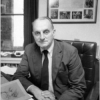Louis Auchincloss

Louis Auchincloss
Louis Stanton Auchincloss was an American lawyer, novelist, historian, and essayist. He is best known as a prolific novelist who parlayed his experiences into books exploring the experiences and psychology of American polite society and old money. His dry, ironic works of fiction continue the tradition of Henry James and Edith Wharton...
NationalityAmerican
ProfessionNovelist
Date of Birth27 September 1917
CityLawrence, NY
CountryUnited States of America
I think Shakespeare got drunk after he finished King Lear. That he had a ball writing it.
Novels must have verisimilitude, and truth has little enough of that.
Only little boys and old men sneer at love.
Perfection irritates as well as it attracts, in fiction as in life.
I had always been considered such a nonentity where human relations were concerned that the idea that I might have an influence, even a corrupting influence ... penetrated my heart with a fierce little sting of pleasure.
There is a charm, even for homely things, in perfect maintenance.
Frederick Buechner can find grace and redemption even in the shoddiest, phoniest aspects of a cultural wasteland. One reads Lion Country...with hope and delight.
As the classes in modern life come together, we have become much more intensely class conscious. It's a very curious thing. But I deal with human beings with whom I've come in contact and have had a chance to closely observe. Their upper-classness is not a matter of particular fascination for me.
I don't give a damn what people think.
Great lecturers seldom hesitate to use dramatic tricks to enshrine their precepts in the minds of their audiences, and at Yale perhaps Chauncey B. Tinker was the most noted. To read one of his lectures was like reading a monologue of the great actress Ruth Draper--you missed the main point. You missed the drop in his voice as he approached the death in Rome of the tubercular Keats; you missed the shaking tone in which he described the poet's agony for the absent Fanny with him his love had never been consummated; you missed the grim silence of the end.
Not the least of the hardships to which the dying are subject is the visitation of their loved ones. The poor darlings, God bless them, may feel every impulse to condole and console, but their primary sensation is nonetheless one of embarrassment in the presence of the unspeakable and a guilty gratitude that it is not yet their fate.
I couldn't bear to see a chapter of the gospel turned into a chapter of Trollope.
I don't know enough about the lower classes to write about them. I don't feel with them, and that could be regarded as a defect, a limitation of my imagination. I could put myself in their position, but not politically. The idea of writing a story or a book about somebody completely devoid of appreciation of anything I care about is completely foreign to me.
In my day, they were not interested in making boys happy. Those schools were made for the types of men who would become quite successful. It was brutal. They are not brutal today. They are country clubs today.